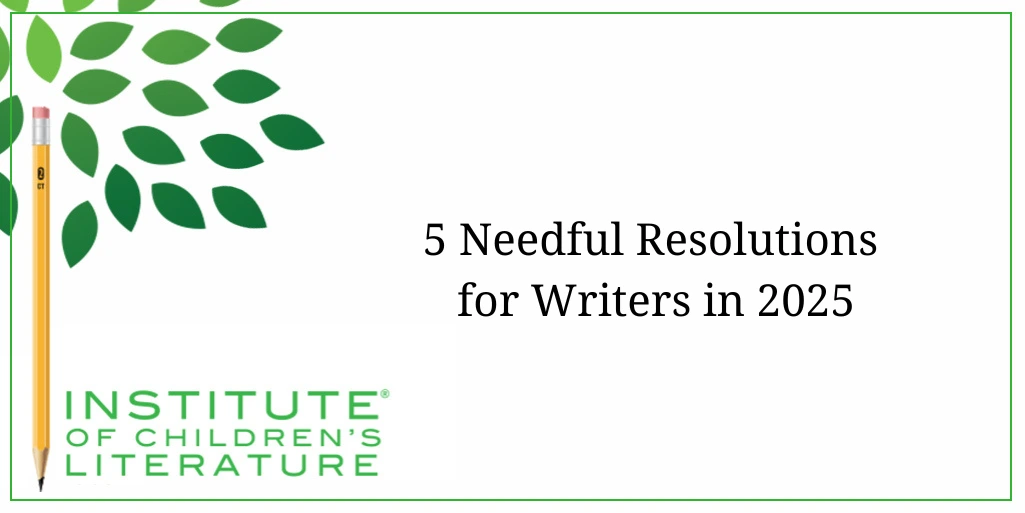
- Date: January 16, 2025
- Author: Jan Fields
- Category: Writing for Children Blog
- Tags: 2025, resolutions, writing
We teach our students how to write and get published!
View our Course Catalog >
5 Needful Resolutions for Writers in 2025
A new year inspires people to make resolutions, and that can be a good thing. But too often, the things we resolve become forgotten long before the winter wind dies down and the spring flowers bloom. But that doesn't mean you should quit working toward the best year you can have. The healthiest. The most productive. The most rewarding. But to do that, there are a few resolutions that you should try to hang onto, because they can truly get you where you want to go. 
Read
I talk a good bit about reading. As a writer, there is nothing more beneficial to my work than reading. I read short stories when time is tight. I read essays about writing every single day. I read books that I choose simply because they look interesting. I read books because they are in my field, and I really need to keep an eye on what is selling in my field. I read news stories about libraries and schools and publishing.
Every single thing I read teaches the writing side of my brain. I learn how others have put words together to convey information, or emotion. I meet people who only exist in the minds of another writer, and as I read them, they exist for me as well. That magical event feeds the writer in me every time. And when I fall hard for a character, I'll think about them after the story is done. And I'll consider what the writer did to make that magic work. I'm the student of every writer whose work I read. Sometimes they teach me by the things they did right. But they'll teach me by the things they did wrong as well. They'll make me aware, so I can better avoid doing those things myself.
If you don't have more reading in the resolutions, you should pencil it in. Now, there is something important to say about reading. Not every writer finds reading an easy thing. Some people become writers because of the struggles they had with books as a child, a struggle they may still have. So, know that this reading resolution don't just mean words on a page. It can mean audiobooks too. I try to consume a balance of short things (short stories, short essays, short articles) and long things (novels and nonfiction books). I do read fluently and easily, but sometimes it's hard to find the time. So, I also consume audiobooks. And I've found they help too. For me, they don't help as much, but they help.
Research
 Beyond reading, another vital resolution to hang onto is research. Adults have a tendency to drop research by the wayside once they “grow up.” They see research as something they had to do for school. But research is incredibly valuable for a writer. It is a way to ensure the things you write are accurate and true, even when they're fiction. And being able to research helps me avoid scams. I check out everything I can so that I don't make mistakes that cost me valuable time in my career and cost me money I don't have in excess.
Beyond reading, another vital resolution to hang onto is research. Adults have a tendency to drop research by the wayside once they “grow up.” They see research as something they had to do for school. But research is incredibly valuable for a writer. It is a way to ensure the things you write are accurate and true, even when they're fiction. And being able to research helps me avoid scams. I check out everything I can so that I don't make mistakes that cost me valuable time in my career and cost me money I don't have in excess.
Being a person who makes research a part of your life will fall for fewer offers that are “too good to be believed.” A person who makes research a part of life will also know how to support a position so that they can help others. This is a skill children's writer need. Much of what we write, whether fiction or nonfiction, is meant to benefit the reader. The readers will get a good story, but they'll get something more.
Long ago, I read Jurassic Park. It's a good book. It's scary and engaging, but it did more. It got me interested in genetics again. I'd been interested in genetics in college, but then I'd graduated, and life took over. But Jurassic Park woke me up and filled my head with questions. And when the book was done, I went on to look things up and learn and read about the science involved. We can do that for kids too. If we're careful researchers, we can create careful researchers by tempting them with fascinating information, even in the middle of a terrific rollicking yarn.
Writing Exercises
Because I write so much, I constantly try to feed my creative brain. I constantly seek ways to get my brain to think about story in new ways. I try to keep things fresh and new. And I find writing exercises are a good way to do that. I know I've talked about writing exercises before. You can find writing prompts in writing books, in writing courses, in online blogs, in apps, etc. You can also find them in places you weren't looking.
Imagine you want to do more contemporary, realistic fiction. You might go through Amazon or maybe through book recommendation lists and read blurbs about all the realistic fiction books you find for the age group that interests you. You can make a list of interesting elements you find. Maybe you read a book where the main character bakes to distract herself from her problems. So, you add baking to your list. And maybe her problem is that her parents are getting a divorce, so you add that too. You keep adding and adding until you have a nice robust list.
Then you can find one of the many random wheel-generating apps online. You can load all your things on your list into the app. Then you can spin it a few times to get elements to combine. It's like Wheel of Fortune, but with ideas. Or if you don't like apps, you could write your list on index cards, then shuffle them and draw out some options. Then see if these unexpected combinations lead to new ideas.
Or maybe you could just read lots and lots of book blurbs and then come up with your own. Maybe the silliest book blurb you can think of. Or the scariest. Or the most tear-jerking. It was by doing something like this that I came up with a silly blurb for a book I eventually wrote when I was approached to come up with a book for a literacy program.
I keep track of all the ideas that come from these kinds of exercises in a single computer file. And I read through them sometimes when I want to jump into a new project.
Exercise

I am the worst person in the world for holing up in my office and letting the day pass while I'm on the computer. I'm getting older, and I really can't keep doing that. So about two years ago, I added daily exercise on a stationary bike to my day. I do it before I do anything else, and it's great. I feel much better. But it's not enough. So, this year I added time spent outside to my resolutions. Some days I don't do much. Something, honestly, I simply turn my walk out to get the mail into a wander around the yard. But I'm walking on grass, so I figure it counts.
I get an unexpected benefit from exercise. I feel cheerier. Which is hugely helpful all by itself. But that kind of aimless physical exercise also helps me create story scenes or work through problems in my writing. Many times, I've gone outside and wandered around the plants growing in our container garden and found my head was rewriting a tough part of a story where I was stuck. And I came back inside ready to write again. And on top of all that, my doctor nags me less. That's always a bonus.
Stand Up for Yourself
The final thing I recommend you scrawl onto your list of resolutions is becoming your own advocate. Part of being professional is recognizing that you are. For years, I tended to hope the people around me would simply start seeing my work as important. At first, I thought that would happen once I started getting published regularly. Then I thought that would happen once I started making more money. Then I thought that would happen once I started being asked to lead workshops, because if other people saw me as professional, surely that would make a difference.
 You know what actually makes a difference? Standing up for yourself and your work. Simply saying “No, I can't do that. I've set that time aside to work on my novel.” Period. Then I kept saying it until it is heard. I didn't give in. I didn't get talked around. I simply insisted. I became a defender of my own success. And when I did that, I became more successful. And I began to get more support.
You know what actually makes a difference? Standing up for yourself and your work. Simply saying “No, I can't do that. I've set that time aside to work on my novel.” Period. Then I kept saying it until it is heard. I didn't give in. I didn't get talked around. I simply insisted. I became a defender of my own success. And when I did that, I became more successful. And I began to get more support.
Sure, I got push back at first. That's natural. When people are used to you setting your work aside for anything they might want, they're going to resist when you change. It's going to be rough for a while. But if you want change. You have to initiate it. You have to stand up for yourself. Stop waiting for the hero who will defend you. Become that hero.
Whatever your resolutions for the new year, you will need to be the change that makes the success happen. It's not always easy. But ultimately, change is the fuel to get you down the road on your writing journey. Zoom! Zoom!
Related Articles for Writing Resolutions
With over 100 books in publication, Jan Fields writes both chapter books for children and mystery novels for adults. She’s also known for a variety of experiences teaching writing, from one session SCBWI events to lengthier Highlights Foundation workshops to these blog posts for the Institute of Children’s Literature. As a former ICL instructor, Jan enjoys equipping writers for success in whatever way she can.

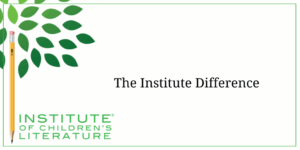
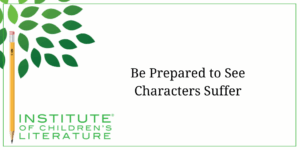
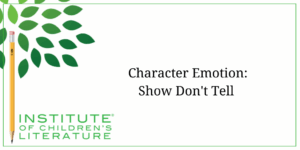
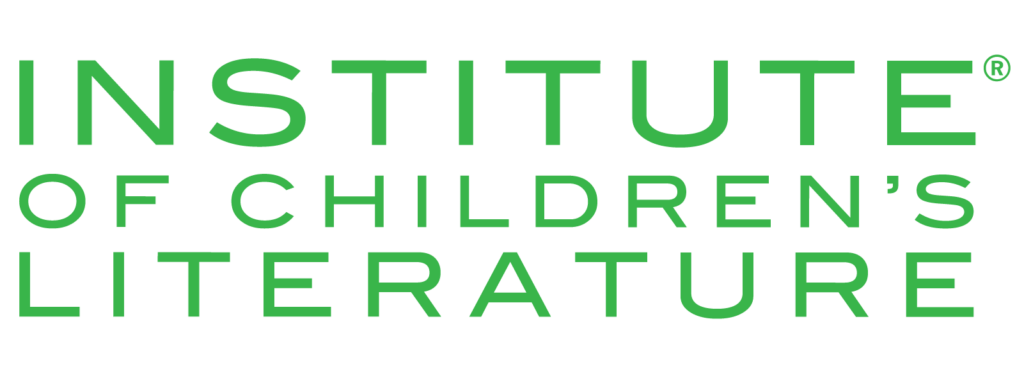
1 Comment
Thank you, Jan. I always learn so much from you. Wishing you a 2025 of writing success!